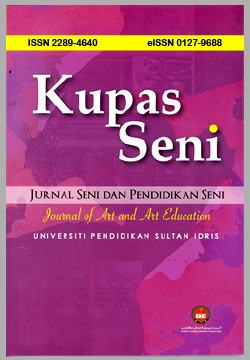Symbolic Interpretation of Daud Rahim’s Visual Artworks in The Context of Social Cultural Change
DOI:
https://doi.org/10.37134/kupasseni.vol10.1.3.2022Keywords:
Interpretation, Symbol, Visual Art, Daud Rahim, Social Cultural ChangeAbstract
Visual art as a medium of human expression is a reflection of the changes that occur in society and culture. This study, therefore, aims to approach, understand and interpret the symbols behind the artworks created by Daud Rahim in the context of social cultural change. This study applies an art study approach that falls under the qualitative method that emphasizes on an in-depth and holistic explanation method based on a conceptual model that is developed based on concepts that are thought to be relevant to be the framework of the analysis. From the result of the analysis and discussion, it was found that the visual artworks created by Daud Rahim used personal symbols inspired from the world of animals and combined with the machine parts. Through the perspective of social and cultural change, the personal symbols he created reveal the human aspects of modern society that has lost it soul (spiritual) because it is too engrossed in the material world. The materialism culture, individualistic attitudes, secularistic process and crisis of spiritual crisis has pushed modern society to focus their attention on the accumulation of material things and goods until finally causing them to be complacent and unable to cultivate spiritual aspects that are very important to their inner life.
Downloads
References
Chaplin, L.N., John, D.R. (2007). Growing up in a material world: age differences in materialism in children adolescents. Journal of Consumer Research, 13(1), 1-19.
Creswell, J.W. (2014). Research design: qualitative, quantitative & mixed methods approach. California: SAGE Publication Inc.
Daud Rahim. (2013). Artist’s statement: jiwa by daud rahim. Kuala Lumpur: UiTM Art & Design Sdn Bhd & Segaris Art Center.
Dillistone, F.W. (2002). The Power of Symbols. Yogyakarta: Penerbit Kanisius.
Joyomartono, M. (1991). Perubahan kebudayaan dan masyarakat dalam pembangunan. Semarang: IKIP Press.
Linton, R. (1984). The study of man. Bandung: Penerbit Jemmars.
Ogden, C.K., Richards, I.A. (1989). The meaning of meaning. San Diego: Harcourt Brace Javanovich.
Poespoprodjo, W. (1987). Interpretasi: beberapa catatan pendekatan filsafatinya. Bandung: Penerbit Remaja Karya CV Bandung.
Ricoeur, P. (1981). Hermeneutics and human science. Cambridge: Cambridge University.
Rohidi, T.R. (1994). Pendekatan sistem sosial budaya dalam pendidikan. Semarang: IKIP Press.
Rohidi. T.R. (2000). Kesenian dalam pendekatan kebudayaan. Bandung: Penerbit STISI.
Rohidi, T.R. (2011). Metodologi penelitian seni. Semarang: Penerbit Cipta Prima.
Rosana, E. (2015). Agama dan sekularisasi pada masyarakat moden. Jurnal Al-Adyan, 13(1), 141-156.
Saidi, A.I. (2008. Narasi simbolik seni rupa kontemporer Indonesia. Yogyakarta: ISAAC Books.
Salman, N. (2016). Peradaban: spiritualisme dan materialism. Retrieved from http://ikmalonline.com/peradaban-spiritualisme-dan-materialisme/
Sarinah. S. (2016). Ilmu sosial budaya dasar. Yogyakarta: Deepublish Publisher.
Stankard, S. (2013). Jiwa: jiwa by daud rahim. Kuala Lumpur: UiTM Art & Design Sdn Bhd & Segaris Art Center.
Sutardi, T. (2007). Antropologi: mengungkap keragaman budaya. Bandung: Penerbit PT Setia Purna Inves.
Ting, S.T., Nishida, T. (1991). Culture, face maintenance and conflict styles of handling interpersonal conflict: a study in five cultures. International Journal of Conflict Management, 2(4), 275-296.
Turner, C. (1999). Tradition and change: contemporary art of asia and the pacific. Queensland: University of Queensland Press.
Downloads
Published
Issue
Section
License
Copyright (c) 2022 Hamidi Abdul Hadi, Zahirah Harun, Issarezal Ismail, Ishak Ramli

This work is licensed under a Creative Commons Attribution-NonCommercial-ShareAlike 4.0 International License.





